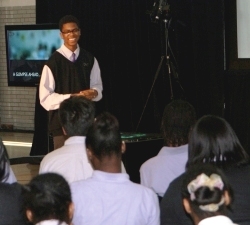 Today is William Hillcourt’s date of birth… he is featured on the home page of Wikipedia, and he is prominent in my mind. As 100,000 Scouts celebrate at the National Jamboree, I’m thinking back to the amazing time I had with my friend nearly two decades ago, and the first time we met at AP Hill.
Today is William Hillcourt’s date of birth… he is featured on the home page of Wikipedia, and he is prominent in my mind. As 100,000 Scouts celebrate at the National Jamboree, I’m thinking back to the amazing time I had with my friend nearly two decades ago, and the first time we met at AP Hill.
In 1991, I was 19 years old and William “Green Bar Bill” Hillcourt was 91. He used to get a kick out of the symmetry of those numbers, and the fact that we spent nearly every day of that year together as unlikely friends.
I had come to know Bill Hillcourt not unlike thousands of others he met each year… I waited in line at the 1989 National Jamboree to have a couple of books signed for my Scoutmaster back home. I really didn’t know or think much about who Bill was, I just knew the recipients of those books would appreciate that I had gotten his signature on one of more than 30 books Bill had written on Scouting and the outdoors.
We had a brief conversation that hot summer day of the Jamboree, but it resonated. The following year in organizing for the 75th anniversary NOAC, I reached out to Bill and asked him to write a memoir of his friend Urner Goodman for the event publicity material. The friendship took hold, as we swapped drafts and edits over several months.
Soon Bill invited me along to travel with him as he toured the country visiting Scouting events each weekend, speaking to thousands who were enchanted by his passion and zeal for the Movement of Scouting. We spent the summer of 1991 in Seoul as honored guests of the World Jamboree. It was there, when we stepped off the plane and were greeted by Korean Scouts who clamored for Bill’s attention that I first began to appreciate the worldwide impact Hillcourt had on Scouting.
Later that year, I left my home and moved across the country to live with Bill in New York, helping him publish new editions of his Baden-Powell biography. As a young man Bill had a special relationship with Baden-Powell, who was in the twilight of his life. He admired and learned much from his friend.
Bill and I conducted interviews for hours each day, talking about the history of Scouting and the history of the world, all from a firsthand perspective. In retrospect, I missed so much of an opportunity to learn more from him, and I was so unprepared of the opportunity or responsibility, but it was an amazing gift nonetheless.
We spent most of 1992 traveling and writing and talking. Late that summer, Bill left for an around the world trip for Scouting (I stayed behind to coordinate a book release that was coming off the press, and was to meet up with him in his native Denmark in a few weeks). His trip began in Japan, where a new translation of one of his Scouting books was being released, and on to Moscow. This was just after the fall of the Soviet Union, and Bill had been asked to come to Russia and help draft Scoutmaster training materials for an emerging program that had been hidden for decades in the shadows.
He went on to Sweden, where he spent some time with his friends at the Silva Compass Company… Bill and his friend Bjorn Kjellstrom had collaborated many decades before to make orienteering and the liquid filled compass a sport. He was to leave Sweden, and meet up with me in Denmark, where we planned to spend a few weeks, away from the crowds and the busy travel schedule, focused on Bill’s own autobiography.
On November 9, 1992, Bill Hillcourt shockingly, surprisingly passed away. It’s a good thing, I think, to die at 92 years old and have it be a surprise to everyone you knew. He was as mentally awake and physically strong as could be, all the way to his final day. I was a kid, chasing him around the globe, and often I couldn’t keep up.
Bill Hillcourt was my friend. That’s a funny thing about him… when he died, I wrote to notify a few thousand people listed in his address book. Many of these people were just contacts that had coordinated some weekend Scouting event that he might have attended, probably only meeting Bill once or twice. But the boxes of reply cards and letters I received told a much different story… for years I encountered thousands of people who would tell of what a special relationship they had with Bill.
It didn’t matter if you were a young Scout waiting in line for a signature, or if you were some Scouter coordinating an event somewhere for Bill to visit. It didn’t matter if he had stayed in your home one night, or you had swapped letters to discuss Scouting. Bill had an amazing gift for making people he encountered feel special, for letting people know how important the relationship was to him.
Bill didn’t always agree with the direction BSA followed, and throughout a nearly 75 year career, he was brought in several times to “right the ship” of Scouting when others drove it off course. I’m sure he’d find plenty about today’s organization that could and should be better. But I also know that the Movement of Scouting, which Bill believed thrived in the spirit of the Patrol, the challenge of the outdoors, and the mentoring of leadership, would continue to make him proud.
I learned so much from Bill Hillcourt… there’s so much more I could have learned, and our time together was fleeting. He had incredible confidence in me, but even higher expectations. Bill showed me, through his trust, that expectations are what raise a child. I will spend my life, often falling short, but always reaching for the expectations and example he set.

 Bill Gates’ favorite teacher
Bill Gates’ favorite teacher







